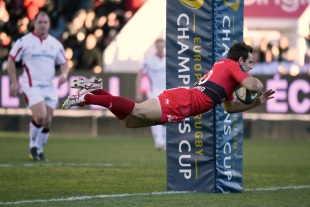|
Monday Maul
Can Irish pride be salvaged in Europe?
Huw Richards
January 19, 2015

Munster players reflect on a comprehensive defeat by Saracens © Getty Images
Enlarge
For the last seven seasons of the Heineken Cup, Irish teams were accustomed to progressing in company. But with a changing of the name has come a change of fortunes for the provinces in Europe's elite competition. Assuming Leinster do what is necessary to progress next weekend, this will be the first season since 2007-8 with only one play-off qualifier from Ireland. In two of the six seasons in between Ulster, Munster and Leinster have all progressed - most recently last year, when all three topped their pools. The trio's combined pool stage record in those six seasons was W81 D3 L24, a winning percentage of 76.4 per cent. So this year represents something of a comedown, with two wins out of three needed next weekend to break even. Saturday's results were not wholly unexpected. While Leinster eviscerated the already eliminated Castres, Ulster suffered the fate likely to be visited on any team which goes to Toulon ravaged by injury and with nothing to play for. 
Nicolas Sanchez and Toulon were just too good for injury-hit Ulster
© Getty Images
Enlarge
Nor was it terribly shocking that Munster lost to Saracens. The pre-match prognosis in the press room was that the only reason to expect any other outcome was Munster's proven ability to make a nonsense of predictions of their demise. It was possible to think back to the bus journey back into Toulouse after Munster lost to Castres at the end of the pool stage in 2002. While they had qualified, the Munsterman sitting next to me was pessimistic, not least since local legends Peter Clohessy and Mick Galwey were in their final seasons. "We've had a good run in the last couple of years, but I think it's over," he opined. Yet Munster had scarcely begun - there have been two wins, three finals and nine semi-finals since that bus ride. Yet more than a few of the Munster thousands departing Allianz Park on Saturday may have been thinking similar thoughts. It was the extent and the manner of the defeat which were sobering. The 33-10 loss was Munster's heaviest in this competition since a 60-19 reverse at Toulouse in 1997. Never before have they lost three consecutive ties in the same season. Much of the credit must go to Saracens. Their clinical, controlled play fully merited the margin of victory. Munster played only as well as they were allowed, which was not very well at all. Saracens had no need to echo the devices of the past for drowning out Munster's fans. Even they need something to cheer. There were still things to admire in Munster's play. It was typical that they produced their best rugby when down to 14 men and that they should have defended so resiliently in a second half during which they had little to play for and not much more possession. Even in such unpropitious circumstances, the quality of Felix Jones and Simon Zebo was evident. But as coach Anthony Foley admitted, they did not really turn up. It was a shock to see them so outmuscled, particularly in the scrums. There were far too many handling errors, some for the most un-Munsterlike reason of over-elaboration. It would be rash to assume that this pattern of Irish disappointment will transmit itself to the national team. England failed to supply a semi-finalist only once in their first 12 seasons of participation - in 2003, when they had perhaps the best year ever enjoyed by any national team. One possible culprit is the new tournament structures. A strong element in their creation was a desire by English and French clubs to cut the Irish down to size by removing the perceived advantage of not having to qualify. And is it possible that the greater financial muscle of the English and French is at last beginning to hit Ireland, as it previously hurt the Welsh franchises? Munster's loss of highly promising midfield back JJ Hanrahan to Northampton may be a straw in that particular wind. I put both thoughts to Munster's assistant coach Ian Costello last week. A thoughtful, judicious man, he did not reject either out of hand. But he pointed both to the extent of the injuries which have hit all three Irish teams this season and that, while losing Hanrahan is a disappointment, Munster have seen off well-heeled suitors for three or four other bright young players in recent weeks. It would, he argued convincingly, be premature to draw too many conclusions from a single below-average year. A couple more seasons like this, and there may be reason for Ireland to worry. In the meantime it is well worth thinking back to 2007-8, the last time the Irish trio lost more matches than they won at the pool stage, and only one progressed into the quarter-finals. The winner of that year's Heineken Cup? Munster. © ESPN Sports Media Ltd
|
Live Sports
Communication error please reload the page.
-
Football
-
Cricket
-
Rugby
-
- Days
- Hrs
- Mins
- Secs
F1 - Abu Dhabi GP
Abu Dhabi Grand Prix December 11-131. Max Verstappen ()
2. Valtteri Bottas (Mercedes)
3. Lewis Hamilton (Mercedes)
4. Alexander Albon ()
5. Lando Norris ()
6. Carlos Sainz Jr ()
-
ESPNOtherLive >>
Golf - Houston Open
Snooker - China Open
Tennis - Miami Open

